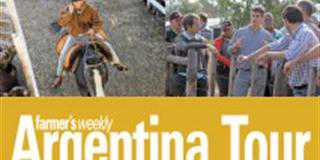The use of compost tea in South Africa is a relatively new fertiliser innovation and has been met with huge scepticism by some agriculturists. Those who have incorporated it into their production cycles are convinced it really makes a difference. Glenneis Erasmus speaks to a few farmers and specialists.
The pros and cons of compost tea is currently a hot topic among agriculturists. While some outright reject it as rubbish due to lack of scientific proof and standardised recipes, measurements and applications, there are those who swear by it. “It’s true that scientific proof helps to build confidence in a product, but anecdotal evidence abounds. One can’t discount some farmers’ experience or say that compost tea doesn’t work, just because the results aren’t scientifically substantiated,” says Jako Pieterse who has his own company, Ecosoil, that specialises in compost production. A laboratory manager at the Soil Foodweb Institute of South Africa, Stephanus Malherbe agrees, “I’ve seen many farmers achieve improved yield and soil health with what I considered to be rather poor-quality compost tea. I’m not advocating the use of substandard compost tea, all I am saying is the cost of synthetic fertiliser is rising astronomically, making it increasingly difficult for farmers to remain profitable. Scientist would be much more useful if they followed up on the findings of farmers and helped them to identify what works.”
Duncan Dicey who farms at Nooitgedacht in Wolseley affirms that it definitely isn’t a quick fix or stand-alone solution to production problems. “Compost tea application should be incorporated into other sustainable production methods to enhance soil and plant health. We’ve been using it for two seasons and have seen significant improvements in our soil structure. We’re hoping that in the long run it will re-establish soil health and help us become less dependent on synthetic fertiliser that depletes the soil.” Obvious improvements This aspiration to reduce fertiliser costs doesn’t seem too far from being realised.
Before starting Ecosoil, Jako was a fruit-farm manager at Karweyderskraal near Hermanus for 15 years. During his last five years, the use of compost tea in a fertigation system helped reduce the amount of minerals being leached from the soil. The average phosphorous levels in the orchard increased from 38,3 parts per million (ppm) in 2000 to 55,1ppm in 2004, while the manganese content went from 7ppm to 10ppm. Sulphur increased from 7,1ppm to 27,2ppm and carbon increased from 2,2ppm to 2,5ppm. Nitrogen applications were cut by 70%. Jako, along with Soils Alive that also specialises in compost production, have recently been involved in studies on potato production in the Sandveld. So far the yield increase in the potato cultivar FL2006, treated with compost tea and other biological products, has been 11%. In a control cultivar the yield was 43,4t/ha, while the FL2006 achieved a yield of 48,2t/ ha, with a fertilisation reduction of 20%. The results are even more significant considering the potatoes were harvested three weeks earlier than usual due to a shortage of potatoes for the potato chip market.
The increased number of beneficial microorganisms in the soil has improved soil health and structure, making compost tea one of the most powerful tools organic farmers have to enhance production. Bruce Gilson, who farms fruit organically on his farm Tierhoek situated in the Breede River Valley, can’t imagine farming without it. “Combining compost and mulches significantly improved our soil structure. The soil is softer and smells better. There’s an abundance of earthworms indicating healthy soil. Healthy soil results in fewer pest and disease-related problems.” Ferdie Richter who farms just outside Keimoes agrees, “We have three blocks of sultana grapes right next to the Orange River. The two blocks treated with compost tea showed a higher resistance to downy mildew than the untreated block. The increased resistance reduced my disease-control costs.” The most remarkable thing about compost tea is that it makes it relatively simple and inexpensive to achieve dramatic results. Bruce adds, “We make our own compost tea and use it on a regular basis as foliar feed through fertigation. Our tea consists of about 10ℓ of good quality compost, 2ℓ of fish emulsion and 2ℓ of kelp, all diluted in 1 000ℓ of water. The mixture is aerated and brewed for between 18 hours and 20 hours and is then ready to use.
Around 100ℓ of compost tea is applied to the orchards every week from July and August, until the first autumn rains the following year, at a cost of only R0,10/ℓ”. Even so, there is a lot of criticism of the use of compost tea. It’s difficult to distinguish beneficial from non-beneficial organisms or measure good quality. Stephanus confirms this, “The most effective way to identify organisms is through DNA testing. Such tests are expensive and time- consuming – farmers can’t afford to wait months to get results. Making use of the old, culture technique takes only two days. The problem is that microorganisms are volatile. If somebody posts the tea and it takes two days to get to us, the sample no longer reflects what the farmer has in his tank.” This, however, should not be seen as an obstacle, according to Stephanus. “We look at the sample through a microscope and identify the extent of the biodiversity, as different microorganisms have different functions. The more diverse the range of microorganisms, the healthier the soil is likely to be,” he says. He advises farmers to ensure that their compost is of good quality and to rather have it analysed.
Jako agrees. He believes compost used for compost tea should be purpose-made. “There’s not enough attention to detail in the making of ordinary compost. Controlling temperatures and ensuring aerobic conditions throughout the heap to prevent a build-up of pathogens are imperative,” he says, adding that the more diverse the starting material, the more diverse the finished product. Contact Jako Pieterse on 072 906 1636.
Does it work or not?
Claims that there is no scientific evidence that compost tea actually works seem unfounded. A literary review by Dr Steve Scheuerell and Dr Walter Mahaffee published in Compost Science and Utilization, 2002, summarises findings by numerous scientists on the benefits of aerated and non-aerated compost teas. There is debate over whether it’s necessary to aerate compost tea or not. Jako feels that it’s necessary, as beneficial microorganisms need oxygen to multiply. Another advantage of aerated compost tea is that it’s quicker to produce – between 18 hours and a couple of days, depending on the organism diversity needed in the finished product.
Non-aerated compost tea can take up to 21 days before it is ready. A disadvantage of aerated compost tea is that it requires mechanisation for continuous air addition. Scheuerell and Mahaffee point out that non-aerated compost tea is associated with lower costs, low energy input and more documented reports of plant-disease control. There have been reports that non-aerated compost tea could cause phytotoxicity and provide an optimal environment for human pathogen regrowth, but the two authors did not observe phytotoxic symptoms when they used non-aerated compost tea as foliar spray or potting-mix drench, nor have they come across any documented evidence to substantiate such claims. Low oxygen conditions are ideal for most human pathogen growth anyway.
The authors point out numerous reports by producers and the scientific community that reveal disease suppression in crops. For some plant diseases, the level of control is considered inadequate for conventional agriculture. However, organic producers with limited control options, consider even this partial disease control as a better option than no disease control. Much of the anecdotal evidence lacks sound experimental design, objective assessment strategies or supportive dates. The article suggests the growing number of producers using compost tea is strong evidence of measurable benefits. A better understanding of compost tea and its uses is needed. Scientists are urged to follow up results of growers with replicated field trials to illuminate the extent that compost teas will provide a reliable disease-management tool in the future.









